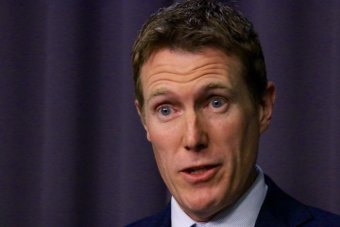Centrelink debt recovery: FOI documents show lack of communication between Social Services Minister and key agencies
Updated
An agency responsible for Centrelink's controversial debt recovery program did not share any documents about it with another key department for nearly a year — even as the program came under immense scrutiny for its failings.
The minister responsible for the scheme during the height of the criticism was also seemingly uninformed, a freedom of information investigation has revealed.
Social Services Minister Christian Porter did not directly receive any written briefings, documents or analysis about the program from Centrelink or his department before publicly proclaiming it was working "incredibly well", documents show.
In a statement, Mr Porter's office said he received "direct verbal briefings" about the program.
"Where he had recourse for supporting documents, those went to the Minister indirectly through the Human Services Minister's Office or through Minister Porter's advisers," the statement said.
The department issued 170,000 compliance notices between July and December last year, but close to 20 per cent of the recipients did not owe any money.
The Department of Social Services (DSS) and the Department of Human Services (DHS) were the two agencies responsible for the program.
But between May 2016 and March 2017, no documents, briefings and analysis on the scheme were sent from DSS to any minister or DHS.
A Department of Human Services (DHS) spokesman said the two departments did work together, despite the lack of documentation.
"[DHS] takes the lead on implementing compliance activities … and works with DSS on matters related to debt recovery policy," he said.
Mr Porter served as acting human services minister while Alan Tudge was on leave in early January.
'Greater interaction might have been beneficial'
Last month, the Australian Taxation Office (ATO) revealed it had no direct conversation with Centrelink until after the program came under widespread criticism.
Deputy Commissioner Greg Williams said the ATO only contacted DHS when it became concerned about its own "integrity".
Around the same time, a National Audit Office report found the DSS had not taken responsibility for monitoring Centrelink's compliance measures.
UNSW Associate Professor of Public Service Research Helen Dickinson said a more collaborative approach between departments could have helped avoid public criticisms.
"This does indeed seem to be an unfortunate situation and greater interaction might have been beneficial," she said.
Melbourne School of Government Professor Janine O'Flynn agreed communication could have avoided many of the problems.
"It seems to me that, when you are introducing such a program, it would make sense to be gaining the expertise of other parties that you will rely on for the success of that," she said.
Debt recovery program investigated
Centrelink's debt recovery program remains the subject of a Senate inquiry, a Commonwealth Ombudsman investigation and an assessment by the Information Commissioner Timothy Pilgrim.
Mr Pilgrim has reserved his judgement on the data-matching program until the Commonwealth Ombudsman releases its findings.
"People expect government agencies to act transparently when handling their personal information, and these expectations are heightened when information has been collected on a compulsory basis, or in exchange for access to essential payments and services," he said.
The DHS and ATO have used data-matching to identify potential debts for decades, but the process was automated last year in a bid to save money, with human oversight greatly reduced.
That process led to thousands of people being contacted about potential debts with the onus of proof placed on the welfare recipient, rather than the Department's compliance team.
Topics: welfare, federal-government, community-and-society, corporate-governance, government-and-politics, tax, australia
First posted










